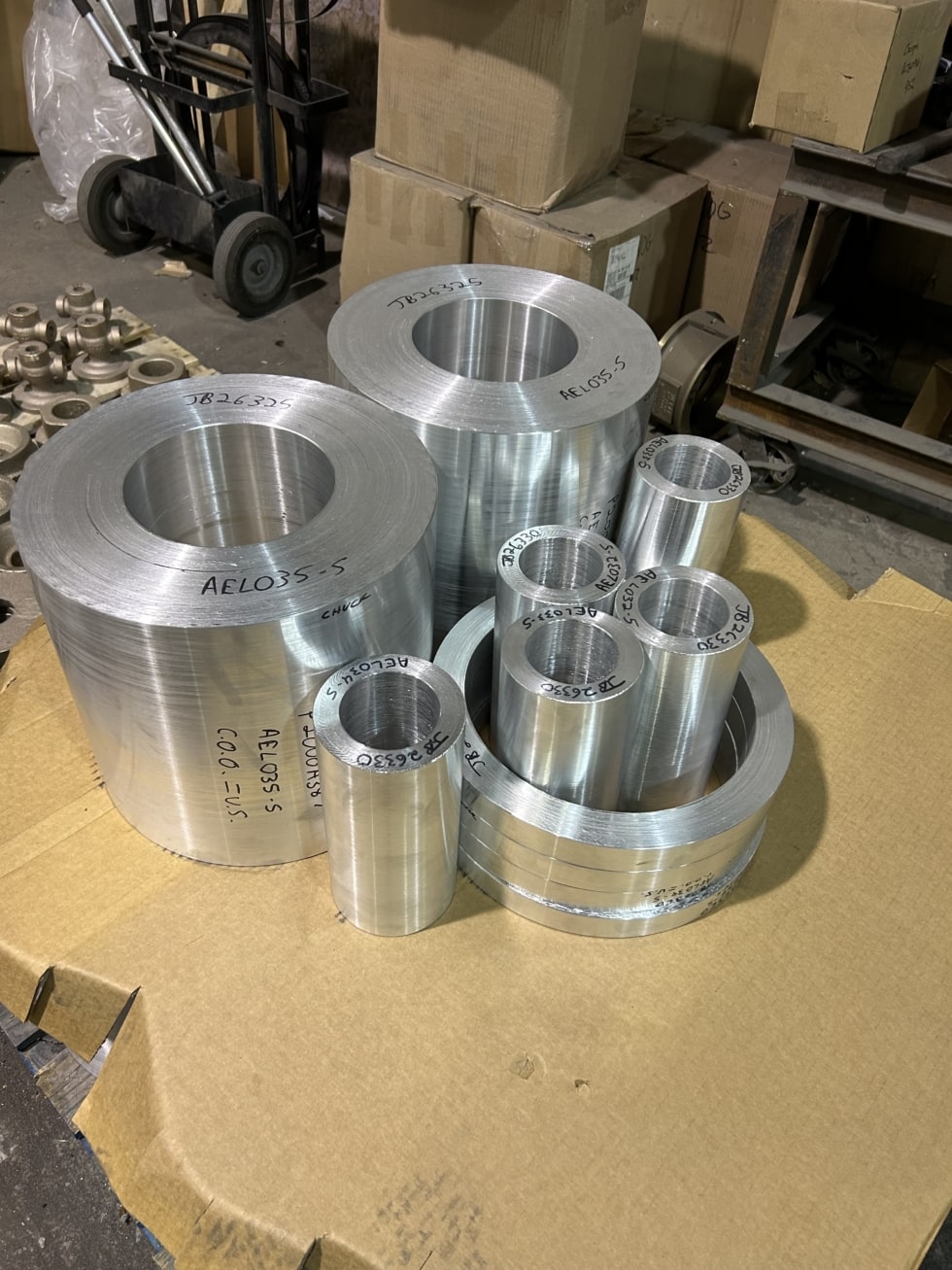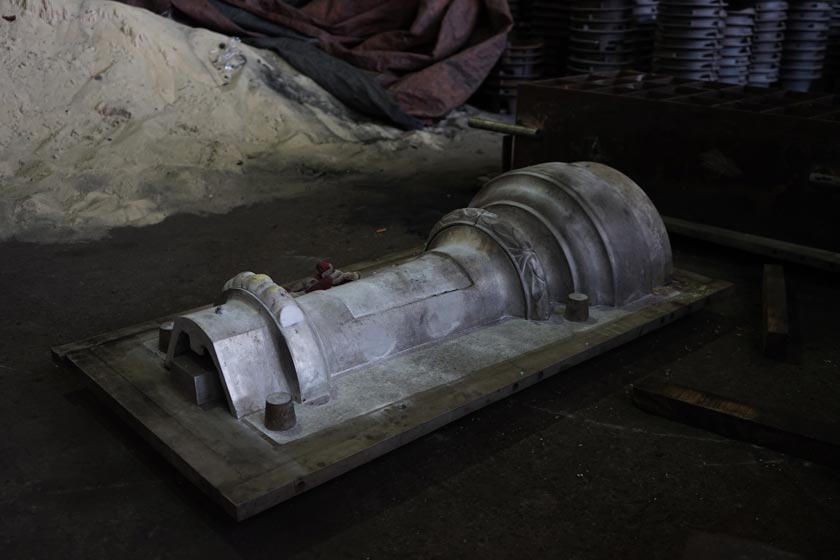Uncovering what makes Aluminum Foundry Wisconsin important in casting
Recognizing the Conveniences and Innovations in the Aluminum Foundry Sector
The Aluminum Foundry industry plays a vital duty in modern manufacturing. Its light-weight buildings especially improve gas performance, particularly in automotive and aerospace markets. In addition, Aluminum's resistance to rust warranties long life in numerous applications. As the sector progresses, technologies such as innovative recycling and additive manufacturing are reshaping production techniques. Exploring these developments reveals not just the advantages yet additionally the difficulties ahead for Aluminum foundries in a quickly changing market.
The Lightweight Benefit of Aluminum
Aluminum's light-weight nature uses significant advantages across various markets, especially in manufacturing and transport. Its low density enables the manufacturing of elements that are much easier to deal with and install, resulting in reduced labor prices and improved efficiency. In the automotive field, lighter automobiles add to improved gas economy and lower emissions, lining up with international sustainability objectives. In aerospace, the usage of Aluminum decreases the overall weight of aircraft, which is critical for boosting performance and minimizing functional costs.
In addition, Aluminum's light-weight residential or commercial properties facilitate innovative layouts that were previously unfeasible with much heavier products. This adaptability makes it possible for makers to create complicated forms and frameworks while maintaining architectural honesty. In general, the light-weight advantage of Aluminum not only improves item performance but likewise drives innovations in innovation and layout, making it a recommended product in numerous applications.
Rust Resistance and Toughness
The Aluminum Foundry sector is renowned for generating materials with superior corrosion resistance, making them suitable for numerous applications. This residential or commercial property, incorporated with improved structural integrity, adds to the long-lasting performance advantages that Aluminum elements use. Consequently, sectors significantly rely upon Aluminum to meet requiring environmental conditions without jeopardizing high quality.
Superior Deterioration Resistance
While different steels face substantial difficulties from environmental variables, Aluminum stands out for its premium corrosion resistance, making it a preferred option in numerous applications. This home is largely due to an all-natural oxide layer that forms on the Aluminum surface area, giving a barrier versus wetness and harsh agents. Unlike other steels that might corrosion or deteriorate over time, Aluminum keeps its honesty even in extreme settings, such as commercial setups or seaside locations. Furthermore, its light-weight nature combined with deterioration resistance makes it optimal for applications in aerospace, automotive, and aquatic sectors. Overall, Aluminum's remarkable longevity not just enhances item long life yet also minimizes maintenance costs, providing an engaging advantage for consumers and makers alike.
Boosted Structural Integrity
Designers and designers significantly recognize the importance of enhanced architectural honesty in contemporary applications, where both corrosion resistance and sturdiness are crucial. Aluminum alloys, understood for their light-weight residential properties, additionally exhibit phenomenal resistance to deterioration, making them appropriate for severe atmospheres. The innovative methods employed in the Aluminum Foundry industry add significantly to producing parts with enhanced longevity. Advanced casting processes and alloy compositions are tailored to fulfill specific performance demands, ensuring that frameworks can withstand severe problems without jeopardizing stability. In addition, surface area treatments and coatings boost the life-span of Aluminum products, even more minimizing degeneration gradually. This focus on enhanced architectural integrity not only prolongs the usability of materials however additionally lowers maintenance prices, strengthening Aluminum's position as a product of selection in various sectors.
Lasting Efficiency Conveniences
Lasting performance in Aluminum components is largely credited to their exceptional rust resistance and sturdiness. Unlike lots of metals, Aluminum normally develops a safety oxide layer, which avoids rust and deterioration in different settings, consisting of commercial and aquatic settings. This fundamental building substantially prolongs the lifespan of Aluminum items, reducing maintenance and substitute expenses. In addition, the light-weight nature of Aluminum enhances its applicability throughout markets without compromising toughness. The material's resistance to put on and tear likewise contributes to its integrity in demanding applications, making it a perfect selection for automobile, aerospace, and construction fields. As markets significantly prioritize sustainability and long life, Aluminum's efficiency benefits line up with modern design requirements, strengthening its role in cutting-edge production processes.
Environmental Influence and Sustainability
 As the Aluminum Foundry industry progresses, it increasingly prioritizes environmental influence and sustainability, identifying the need for accountable techniques despite climate change. Efforts to lessen waste and power consumption are at the leading edge, with More about the author lots of shops adopting recycling initiatives to recover Aluminum scrap. This not only minimizes basic material use but also notably reduces energy expense, as recycled Aluminum calls for just a fraction of the energy compared to primary production.
As the Aluminum Foundry industry progresses, it increasingly prioritizes environmental influence and sustainability, identifying the need for accountable techniques despite climate change. Efforts to lessen waste and power consumption are at the leading edge, with More about the author lots of shops adopting recycling initiatives to recover Aluminum scrap. This not only minimizes basic material use but also notably reduces energy expense, as recycled Aluminum calls for just a fraction of the energy compared to primary production.Furthermore, improvements in discharges manage modern technologies are being applied to lower air toxins, straightening procedures with more stringent ecological laws. Factories are also exploring alternative power resources, such as solar and wind, to power their facilities sustainably. By fostering collaboration with stakeholders, the industry intends to establish cutting-edge remedies that boost environmental stewardship. Collectively, these initiatives highlight a dedication to minimizing the Aluminum Foundry's carbon footprint while promoting a round economic situation within the manufacturing industry.
Advanced Production Techniques
 Revolutionizing manufacturing processes, the Aluminum Foundry sector is progressively integrating sophisticated manufacturing methods to enhance performance and precision. Methods such as computer mathematical control (CNC) machining and additive production have arised as vital parts in enhancing manufacturing workflows. CNC machining enables for high-precision component construction, look at more info greatly minimizing product waste and production time. Additive manufacturing opens new opportunities for intricate geometries and lightweight styles that were previously tough to attain.
Revolutionizing manufacturing processes, the Aluminum Foundry sector is progressively integrating sophisticated manufacturing methods to enhance performance and precision. Methods such as computer mathematical control (CNC) machining and additive production have arised as vital parts in enhancing manufacturing workflows. CNC machining enables for high-precision component construction, look at more info greatly minimizing product waste and production time. Additive manufacturing opens new opportunities for intricate geometries and lightweight styles that were previously tough to attain.Additionally, the implementation of automation and robotics in Aluminum shops streamlines operations, lessens human mistake, and improves worker security. These innovations promote a more responsive production atmosphere, allowing suppliers to adjust quickly to market demands. The combination of sophisticated simulation software program better boosts the design and screening phases, resulting in exceptional product high quality. Collectively, these methods not just enhance functional effectiveness however likewise foster technology, placing the Aluminum Foundry sector at the center of modern-day production.
Technologies in Reusing Procedures
The Aluminum Foundry market is not only progressing in making methods but is also making substantial strides in reusing processes. Innovations are arising to improve the efficiency of reusing techniques, decreasing energy intake and enhancing sustainability. Advanced sorting modern technologies, such as computerized optical sorting, enable the recognition and splitting up of Aluminum from other materials with high accuracy. This brings about a better of recycled Aluminum, which is important for keeping the stability of the final items.
Furthermore, closed-loop recycling systems are being implemented, enabling manufacturers to recycle Aluminum scrap within their own production procedures. This lessens waste and promotes a circular economic situation. Furthermore, study into brand-new recycling techniques, such as hydrometallurgical procedures, offers the capacity for recouping Aluminum from complex waste streams. These technologies not only add to lowering the carbon footprint of the Aluminum Foundry market yet also boost its economic check this site out practicality in a significantly environmentally mindful market.
Applications Throughout Various Industries
Many sectors are increasingly acknowledging the convenience and advantages of Aluminum Foundry products, resulting in prevalent applications throughout sectors such as automobile, aerospace, customer, and construction items. In the vehicle sector, Aluminum castings add to lightweight automobile layouts, boosting gas performance and performance. Aerospace manufacturers utilize Aluminum components for their strength-to-weight ratio, necessary for airplane frameworks and elements.
In building and construction, Aluminum is preferred for its longevity and resistance to corrosion, making it perfect for window frames, roofing, and structural assistances. Customer items additionally profit from Aluminum Foundry items, as seen in kitchenware, electronics, and product packaging, where light-weight and recyclable products are important.
The versatility of Aluminum Foundry techniques enables intricate layouts and specific requirements, satisfying the varied needs of these industries. Consequently, Aluminum Foundry items are ending up being integral to modern production processes across numerous markets.
Future Trends in Aluminum Foundries
As industries remain to develop, Aluminum foundries are positioned to accept several vital patterns that assure to enhance performance and sustainability. One famous pattern is the increasing fostering of digital modern technologies, consisting of automation and synthetic knowledge, which improve operations and enhance quality assurance. Additionally, the push in the direction of sustainable techniques is leading factories to buy recycling technologies, considerably decreasing waste and power consumption.
 Another emerging fad is using sophisticated alloys and products, satisfying the growing demand for light-weight and durable parts across different fields (Aluminum Foundry). Moreover, the combination of additive production strategies is anticipated to transform part style, supplying customization and decreasing preparations
Another emerging fad is using sophisticated alloys and products, satisfying the growing demand for light-weight and durable parts across different fields (Aluminum Foundry). Moreover, the combination of additive production strategies is anticipated to transform part style, supplying customization and decreasing preparationsCooperation with study institutions is also expected to drive development, as foundries seek to establish new processes and materials. Aluminum Foundry. Collectively, these trends show a transformative future for the Aluminum Foundry market, lining up with more comprehensive objectives of sustainability and effectiveness
Regularly Asked Questions
What Are the Normal Expenses Connected With Aluminum Foundry Production?
The typical expenses related to Aluminum Foundry production consist of raw products, labor, energy, equipment maintenance, and overhead expenses. These variables jointly affect the general financial investment required for reliable Aluminum spreading operations.
Exactly How Does Aluminum Compare to Other Metals in Toughness?
Aluminum, while lighter than several steels, displays outstanding strength-to-weight ratios. Contrasted to steel, Aluminum is much less strong yet supplies exceptional rust resistance, making it a favorable selection in applications where weight and longevity are crucial.
What Safety and security Steps Are in Area in Aluminum Foundries?
Precaution in Aluminum shops usually include required individual protective devices, ventilation systems to regulate fumes, regular tools maintenance, training programs for employees, and adherence to stringent safety laws to reduce threats related to liquified metal handling.
Just How Is High Quality Control Managed in Aluminum Casting Processes?
Quality control in Aluminum casting processes entails rigorous examinations at various phases, including basic material evaluation, procedure surveillance, and end product testing. Methods such as analytical process control and non-destructive screening warranty adherence to industry requirements.
What Certifications Are Necessary for Aluminum Foundry Suppliers?
The value of qualifications for Aluminum Foundry providers consists of ISO 9001 for top quality management, ISO 14001 for ecological monitoring, and industry-specific standards like ASTM and SAE, making sure conformity, safety and security, and reliability in producing procedures.
The Aluminum Foundry sector plays a vital duty in modern production. The Aluminum Foundry industry is renowned for producing materials with remarkable deterioration resistance, making them perfect for different applications. Reinventing manufacturing procedures, the Aluminum Foundry sector is increasingly integrating advanced manufacturing techniques to improve effectiveness and precision. The Aluminum Foundry market is not only advancing in manufacturing techniques however is likewise making considerable strides in recycling processes. As markets continue to develop, Aluminum foundries are poised to embrace several key trends that promise to enhance performance and sustainability.